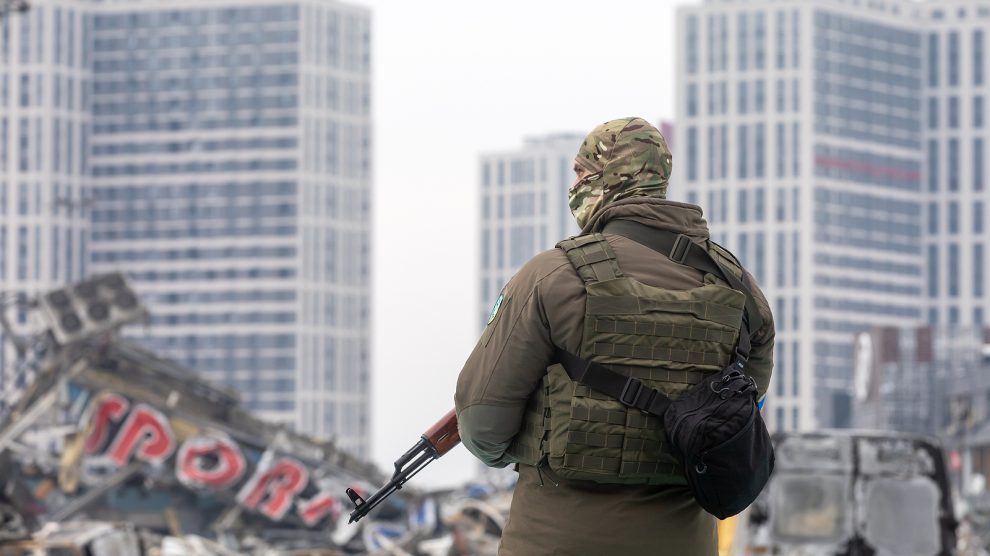Ukraine’s immediate economic goals are to save businesses which are still able to operate, while keeping finance from IFIs flowing.
On February 24, 2022, the Ukrainian economy received a dramatic punch. In the international media we see a lot of attention given to sanctions against the Russian Federation, but the damage that the Ukrainian economy is experiencing amid widespread military action is more serious than the impact of all the heavy sanctions imposed on Russia so far.
- In Ukraine, the process of digitalisation continues, even under cruise missile attack
- A month on from Russia’s invasion, Ukraine’s remarkable IT sector thrives
- There’s cash in our ATMs: The remarkable resilience of Ukraine’s banking sector
We do not have hard numbers on economic performance so far, but our estimates and observations suggest that the damage might range from 30 per cent to 60 per cent of GDP depending on how long the war lasts.
What we do know is that the current active military operations are taking place on territories which used to produce up to 50-60 per cent of GDP before the war started.
While Russian forces are moving primarily across main roads and in many cases cannot reach firms located away from areas of active military operations, there is nevertheless little chance of these firms operating as normal when the frontline is so close to their assets.
Employees tend to move to safer places and only a few entrepreneurs can keep running “business as usual” under huge uncertainty, even if they do not experience direct shelling.
Shifting production
On the upside, we have production capacities in the Western part of the country which will meet the extra demand for consumer goods from internally displaced people. That will take some time, but production of goods and services – as well as retail turnover – will grow. This will compensate the abrupt halt in economic activity in the regions beset with military actions. What’s more, the authorities have created a programme for evacuating the production capacities of Ukrainian enterprises to the Western part of the country.
On the downside, we have millions of refugees crossing the border of the country, hundreds of thousands enrolling to the army, thousands involved in humanitarian supplies and volunteering with supplies for the army. All of them have left the labour force and will have very limited participation in the economic life of the country.
An important point for our survival is the record-high grain harvest of 2021, of which the lion’s share remains in warehouses inside Ukraine. While we are not in a position to export these crops – our seaports are blocked by Russia – the substantial stocks means that there is no risk of hunger inside Ukraine, at least not this year.
Banking sector resilience
The banking sector has proven resilient to the shock of the war. The National Bank of Ukraine (NBU) promptly imposed restrictive measures, fixed the hryvnia exchange rate and provided sufficient liquidity to the system. In the first days of the war we observed multiple businesses trying to switch to “cash-only” operations but in less than a week, after the shock had eased, retail returned to normal and cashless operations again became dominant.
Ukraine is receiving substantial financial support from IFIs and Western counties. On March 9, the IMF approved 1.4 billion US dollars in emergency financing support under the Rapid Financing Instrument (RFI) arrangement.
Other IFIs have committed support in loans and grants. The finance minister has reported that six billion US dollars has already been pledged, and more support is coming. The NBU says that the gross international reserves of Ukraine now exceed the level before Russia’s invasion started (27.6 billion US dollars as of the end of February).
The finance minister has nevertheless reported a plunge in budget proceeds since the start of the war. In the first days of the war the minister said that customs collections were only 15 per cent of pre-war levels. Later he said that budget collections have plunged by nearly 30 per cent. To a large extent, tax payments in March will not show us the real state of affairs since on the one hand many payments would have been set up in advance from pre-war earnings, while on the other the authorities have effectively approved tax holidays for businesses.
Ultimately, the main target for now is to save businesses which are still able to operate, while keeping the finance from the IFIs flowing.
Unlike many news and information platforms, Emerging Europe is free to read, and always will be. There is no paywall here. We are independent, not affiliated with nor representing any political party or business organisation. We want the very best for emerging Europe, nothing more, nothing less. Your support will help us continue to spread the word about this amazing region.
You can contribute here. Thank you.








Add Comment